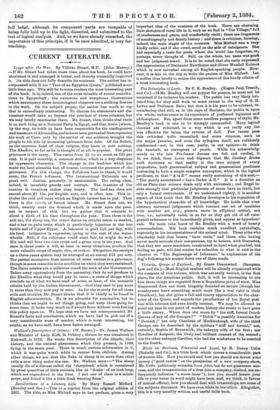The Principles of Logic. By F. H. Bradley. (Kagan Pau},
Trench, and Co.)—If- Mr. Bradley will use pepper for pounce, he must not be surprised if he irritates his readers. The public has very likely irri- tated him, for they still walk to some extent in the way of G. H. Lewes and Professor Bain ; but then it is his part to be tolerant, re- membering that still, as in the days of Socrates, the public is, upon the whole, unfortunate in its experience of professed logicians and philosophers. But, apart from some needless pungency of style, Mr. Bradley's book is one to be strongly commended. Many logical theories are criticised, in a way which is not really any the less effective for being the reverse of dull. Few tenets pass this criticism quite unscathed, and some veterans, such as the major premiss, and even the syllogism itself, are ruthlessly condemned—not, in this case, justly, in our opinion—to drink the hemlock, as corrupters of youth. While his acknowledg- ments to the late Pro fessor Jevons are frill and cordial, it is, we think, from Lotze and Sigwart that Mr. Bradley draws such doctrines as that reality is the true subject of every proposition, both grammatical subject and grammatical predicate coalescing to form a single complex conception, which is the logical predicate, so that "A is B" means really something of this sort,— " The partly ascertained x has a factor A B." It is a doctrine as old as Plato that science deals only with universals ; and Hegel in- sists strongly that particular judgments of sense have no truth, but only a formal correctness. If we understand rightly, it is another aspect of this truth that Mr. Bradley developes in his exposition of the hypothetical character of all knowledge. He holds that even abstract universal judgments which connect one set of qualities with another set (e.g., planets move in elliptical orbits), are true, i.e., universally valid, in so far as they get rid of all cate- gorical reference to the immediately given, and appear as hypotheti- cal,. We must take leave of Mr. Bradley with a word of hearty commendation. His book contains much excellent psychology, especially in his interpretations of the animal mind. Those alike who charitably hold that brutes "have souls," and those who, having never made animals their companions, try to believe, with Descartes, that they are mere machines, constructed to howl when pinched, but feeling no pain, will find matter for reflection in what is said in the chapter on "The Beginnings of Inference," in explanation of the dog's following his master down one of three roads.


































 Previous page
Previous page